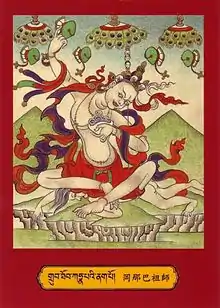Kanha (poet)
Kanha or Kanhapad or Kanhupa was one of the poets of Charjapad, the earliest known example of Assamese, Odia and Bengali literature. He was a tantric buddhist and his poems in Charjyapad are written in a code, whereby every poem has a descriptive or narrative surface meaning but also encodes tantric buddhist teachings. Some experts believe this was to conceal sacred knowledge from the uninitiated, while others hold that it was to avoid religious persecution.

In one of his poem,Kanhupa wrote:
Your hut stands outside the city
Oh, untouchable maid
The bald Brahmin passes sneaking close by
Oh, my maid, I would make you my companion
Kanha is the kapali, a yogi
He is naked and has no disgust
There is a lotus with sixty-four petals
Upon that the maid will climb with this poor self and dance.
The language of Kanhupa's poetry bears a very strong resemblance to modern Odia. For example, :
Ekaso padumo chowshathi pakhudi
Tahin chadhi nachao dombi bapudi
Padumo (Padma:Lotus), Chaushathi (64), Pakhudi (petals) Tahin (there), Chadhi (climb/rise), nachao (to dance), Dombi (an Odia female belonging to scheduled caste), Bapudi ( a very colloquial Odia language to apply as 'poor fellow' )
or
Hali Dombi, Tote puchhami sadbhabe.
Isisi jasi dombi kahari nabe. [1]
These passages do not require any translation into modern Odia language.
Kanha is also a leading contemporary Bengali magazine of poetry and poetry-related essays named after the Charjapad poet.
References
- odia language